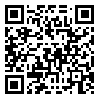Volume 13, Issue 1 (Jan & Feb 2023)
J Research Health 2023, 13(1): 41-50 |
Back to browse issues page
Download citation:
BibTeX | RIS | EndNote | Medlars | ProCite | Reference Manager | RefWorks
Send citation to:



BibTeX | RIS | EndNote | Medlars | ProCite | Reference Manager | RefWorks
Send citation to:
Bagheri Sheykhangafshe F, Fathi-Ashtiani A, Savabi Niri V, Otadi S, Rezaei Golezani H. The Efficacy of Cognitive-Behavioral Therapy on Coping Strategies and Anxiety Sensitivity of Patients With COVID-19 Obsession. J Research Health 2023; 13 (1) :41-50
URL: http://jrh.gmu.ac.ir/article-1-2116-en.html
URL: http://jrh.gmu.ac.ir/article-1-2116-en.html
Farzin Bagheri Sheykhangafshe1 

 , Ali Fathi-Ashtiani2
, Ali Fathi-Ashtiani2 

 , Vahid Savabi Niri3
, Vahid Savabi Niri3 

 , Samaneh Otadi4
, Samaneh Otadi4 

 , Hamed Rezaei Golezani5
, Hamed Rezaei Golezani5 




 , Ali Fathi-Ashtiani2
, Ali Fathi-Ashtiani2 

 , Vahid Savabi Niri3
, Vahid Savabi Niri3 

 , Samaneh Otadi4
, Samaneh Otadi4 

 , Hamed Rezaei Golezani5
, Hamed Rezaei Golezani5 


1- Department of Psychology, Faculty of Humanities, Tarbiat Modares University, Tehran, Iran. , farzinbagheri@modares.ac.ir
2- Behavioral Sciences Research Center, Baqiyatallah University of Medical Sciences, Tehran, Iran.
3- Department of Clinical Psychology, Faculty of Humanities, Ardabil Branch, Islamic Azad University, Ardabil, Iran.
4- Department of Clinical Psychology, Faculty of Humanities, Islamshahr Branch, Islamic Azad University, Tehran, Iran.
5- Department of Experimental Psychology, Faculty of Humanities, Urmia Branch, Islamic Azad University, Urmia, Iran.
2- Behavioral Sciences Research Center, Baqiyatallah University of Medical Sciences, Tehran, Iran.
3- Department of Clinical Psychology, Faculty of Humanities, Ardabil Branch, Islamic Azad University, Ardabil, Iran.
4- Department of Clinical Psychology, Faculty of Humanities, Islamshahr Branch, Islamic Azad University, Tehran, Iran.
5- Department of Experimental Psychology, Faculty of Humanities, Urmia Branch, Islamic Azad University, Urmia, Iran.
Abstract: (2223 Views)
Background: One of the factors affecting people’s mental health is having repeated and confused thoughts about COVID-19. In this regard, the present study was conducted to investigate the effectiveness of cognitive-behavioral therapy on coping strategies and anxiety sensitivity of patients with COVID-19 obsession.
Methods: The present research method was quasi-experimental and pre-test-post-test design with a control group. The statistical population of the study included patients with COVID-19 obsession in 2021. The study sample includes 30 patients with COVID-19 obsession who were selected using the convenience sampling method and were randomly divided into two experimental groups (n=15) and control groups (n=15). The collection tool included a questionnaire on COVID-19 obsession, coping strategies, and anxiety sensitivity. The experimental group received ten 90-minute sessions of cognitive-behavioral therapy, but the control group received no intervention. Finally, the obtained data were analyzed by multivariate covariance analysis in SPSS software, version 24 (P<0.05).
Results: The results showed that cognitive-behavioral therapy significantly increased the problem-oriented coping strategy and decreased the emotion-oriented coping strategy, avoidance coping strategy, and anxiety sensitivity (physical, cognitive and social) in patients with COVID-19 obsession (P<0.01).
Conclusion: The obtained findings indicated that cognitive-behavioral therapy can significantly improve the patients with COVID-19 obsession. Considering the long-term consequences of COVID-19, psychology and counseling centers should take measures to identify and treat vulnerable groups.
Methods: The present research method was quasi-experimental and pre-test-post-test design with a control group. The statistical population of the study included patients with COVID-19 obsession in 2021. The study sample includes 30 patients with COVID-19 obsession who were selected using the convenience sampling method and were randomly divided into two experimental groups (n=15) and control groups (n=15). The collection tool included a questionnaire on COVID-19 obsession, coping strategies, and anxiety sensitivity. The experimental group received ten 90-minute sessions of cognitive-behavioral therapy, but the control group received no intervention. Finally, the obtained data were analyzed by multivariate covariance analysis in SPSS software, version 24 (P<0.05).
Results: The results showed that cognitive-behavioral therapy significantly increased the problem-oriented coping strategy and decreased the emotion-oriented coping strategy, avoidance coping strategy, and anxiety sensitivity (physical, cognitive and social) in patients with COVID-19 obsession (P<0.01).
Conclusion: The obtained findings indicated that cognitive-behavioral therapy can significantly improve the patients with COVID-19 obsession. Considering the long-term consequences of COVID-19, psychology and counseling centers should take measures to identify and treat vulnerable groups.
Type of Study: Orginal Article |
Subject:
● International Health
Received: 2022/09/13 | Accepted: 2022/10/31 | Published: 2023/01/1
Received: 2022/09/13 | Accepted: 2022/10/31 | Published: 2023/01/1
| Rights and permissions | |
 |
This work is licensed under a Creative Commons Attribution-NonCommercial 4.0 International License. |






